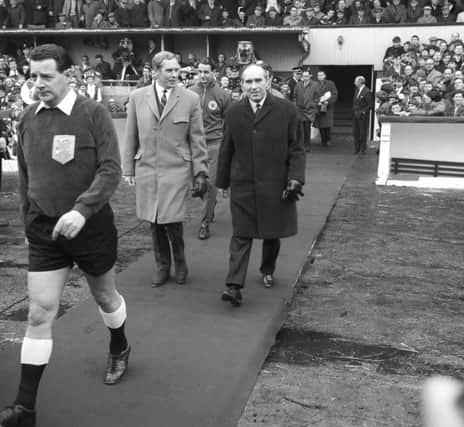‘Welcome to Scotland? You must be f***ing joking’ - Sir Alf Ramsey and his tricky relationship with the Scots


“You must be f***ing joking!” As the first and, to date, only England manager to win the World Cup, his place in that country’s sporting pantheon is assured forever. Likewise, coolness from Scotland is also guaranteed.
His role as mastermind when England’s wingless wonders became world champions is sufficient reason for that. But then his reported antipathy towards Scots also doesn’t help. The well-worn anecdote referenced above is one piece of evidence for the jury to consider. It has now become so mangled that it is hard to gauge its authenticity.
Advertisement
Hide AdAdvertisement
Hide AdThere are multiple variations of the story. Ramsey was arriving at Hampden, at a train station, at Prestwick airport. A radio reporter, a newspaper journalist or possibly even an SFA delegate had ventured to welcome Ramsey to Scotland. “You must be f***ing joking,” he is reputed to have replied in that over-pronounced, supposedly public school tone he is famed for cultivating, partly through elocution lessons.
In actual fact someone perceived as being haughty was actually born in what one family friend described as being little more than a wooden hut. His father was, essentially, a rag and bone man. Such a background is a long way from the epitome of English upper-class entitlement which Scots often portrayed him as being.
Jimmy Calderwood played under Ramsey for a spell at Birmingham. Before his current battle with Alzheimer’s, the former full-back recounted the manager’s first training session after succeeding Willie Bell, another of the Scottish contingent at St Andrews at the time. Kenny Burns joined Calderwood among the Scots on the playing staff. “I know you lot f***ing hate me, well I have news for you – I hate you more,” Ramsey told them on day one.
Calderwood never missed a game under Ramsey and will only say good things about the manager, despite the particularly heavy training session meted out the morning after Scotland qualified for the 1978 World Cup with a win over Wales at Anfield.
Ramsey had spotted Calderwood with his tartan hat and scarf waiting for the bus to take him to Liverpool the previous day – a Scottish crew of sportswriters and players, including Aston Villa’s Andy Gray, had managed to commandeer the Villa club bus to take them there. “Want a lift anywhere, Jimmy?” Ramsey had enquired.
According to veteran sportswriter David Leggat, who got to know Ramsey while working at the Birmingham Evening Mail, “he wasn’t any more anti-Scottish than anyone else in England”. He adds: “It’s just they wanted to beat us like we wanted to beat them.”
Scots’ enjoyment of their side’s 3-2 win over England in 1967 was enhanced, if that’s possible, by the knowledge that Ramsey was in charge of the vanquished world champions. Still, after England defeated Scotland at Wembley in 1971, Ramsey put a consoling arm around opposite man Bobby Brown, the subject of harsh abuse from travelling Scots only four years after the famous victory, as they walked towards the tunnel.
Brown, of course, passed away last week at the age of 96, more than 20 years after Ramsey’s death in 1999 in an Ipswich nursing home following a battle with dementia. He was 79.
Advertisement
Hide AdAdvertisement
Hide AdOne reason why today’s anniversary seems to be passing relatively unnoticed, even in England, is some previous uncertainty over his birth date. To be fair, this was down to Ramsey himself in an apparent attempt to prolong his career. In his ghost-written autobiography, Talking Football, published in 1952 and principally dealing with his playing days at Southampton and Spurs, he states his year of birth was 1922.
The subterfuge only came to light when Ramsey was asked to check the details of his entry in Debrett’s Peerage Baronetage Knightage and Companionage after receiving a knighthood in 1967. As Arthur Hopcraft wrote in The Football Man, “Alf Ramsey the dignified, the aspirer after presence, could not, I am convinced, give false information to the book of the Peerage.” Ramsey alerted compilers to the real date of his birth – 22 January, 1920. Fittingly for an avowed non-drinker, prohibition in the USA began only days earlier.
Martin Chivers will remember to pause a while to reflect today. One of 100 players capped by Ramsey, he was jettisoned following the draw with Poland that meant England could not qualify for the 1974 World Cup. Ramsey stumbled on for two more games before being axed in rather indecent fashion.
Spurs legend Chivers, pictured inset, enjoyed an otherwise productive international career, scoring 13 goals in 24 appearances, including twice in the aforementioned 3-1 win over Scotland at Wembley, his debut at the stadium. “I should have had a third, but that would have been too much,” he told The Scotsman yesterday. Martin Peters, who died last month, got England’s other goal.
“We beat Everton at Tottenham and I was asked to go up to the boardroom – which I had never been to at Tottenham,” Chivers recalled. “Alf was there to ask me to join the squad to go to Malta for my first cap. He was a really friendly fellow – just like my old managers at Southampton, Ted Bates, and Tottenham, Bill ‘Nick’ (Nicholson).”
He was certainly not as aloof as often presented. “I once went down to Southampton and did a Bobby Moore school for kids coaching session and Alf came to present trophies,” continued Chivers. “While he was there, we had a wonderful chat, and he told the boys that the best squad he ever had, including the World Cup final winning one, was the squad that failed to beat Poland.”
“He would have been 100 years old tomorrow? Wow,” he added. “I will be thinking of him, I am thinking of him now.”